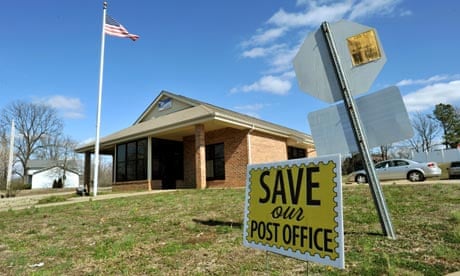Blink and you'd miss Cottage Grove, the tiny town, population 85, set in the rolling hills of west Tennessee. This rural community was known as Todd Town after a local farming family until the late 1850s, when its first postmaster arrived and renamed the village. Now locals fear the service that created their identity 160-odd years ago is about to destroy it.
Cottage Grove's story is being played out across America. The debt-riddled US Postal Service (USPS) is threatening to close 3,200 post offices, including this one. Closures are set for May, so letters of notice could start going out this month. Eventually, some fear, USPS has its eye on 15,000 closures, about half the network.
The USPS's army of critics blame declining mail volumes, the internet and soaring costs for the catastrophe. "The rise of email and online bill-paying, competition from private delivery companies like FedEx and UPS and the recession of 2007-09 have hit the USPS hard," the libertarian Cato Institute reported last year. Mail volume declined by 35bn pieces (about 17%) from fiscal year 2007 to fiscal year 2009.
Even America's postmaster general, Patrick Donahoe, agrees. "While some of the decline is attributable to economic weakness since 2007," Donahoe said recently, "the more significant factor is the continuing transition to electronic alternatives."
In 2000, 5% of Americans paid their bills online; now 60% do. According to the post office's defenders, however, the real culprit is not the internet but USPS's mismanagement and a combination of political hostility and incompetence.
Whatever the truth, it is hitting the service hard. Last month USPS announced the closure of 260 mail processing centres, with the loss of 35,000 jobs. In the last four years 140,000 positions have been lost from the postal service, the second-largest civil employer in the US behind Walmart with 571,000 employees.
Cottage Grove is bucolic in the spring light. A dog stretches in the middle of Church Street; clouds scud across clear blue skies.
"We call this bragging weather," said Mike Waddey, Cottage Grove's Southern Baptist minister and the man co-ordinating the fight against the post office's closure. When he moved to Cottage Grove in 2004, Waddey, his wife and six children upped the population by 6%. Now they make up an even larger percentage. The local shop closed three years ago, and the bank is open only two days a week. If the post office closes, Waddey will be the last man in the village with a full-time job.
The USPS may have based its decision on Cottage Grove's declining numbers, but its post office serves a wider community – 420 people in the surrounding area use the post office's boxes.
More than 100 turned out for a meeting in the baptist church last October, at which a post office spokeswoman listened to locals and said their comments would be studied.
Four days later, they got a standard letter saying their concerns had been heard. "I find it hard to believe they studied that hard," said Waddey. It's a common feeling across huge tracts of the US. Nearly 80% of the post offices marked for closure are in rural communities like this one.
There is no doubting the size of the post office's problems. In February, chief financial officer Joe Corbett warned it would run out of cash in October. USPS ended the last fiscal year with a loss of $5.1bn (£3.2bn).
Steve Hutkins, a New York University literature professor who runs the Savethepostoffice.com blog, points out that the vast majority of USPS's losses are due to an accounting rule imposed on the service in 2006.
The Postal Accountability and Enhancement Act (PAEA) required the postal service to pay about $5.6bn a year over 10 years into a fund to cover retiree healthcare. USPS easily made the first year's payments, then the recession bit and it could not keep up with the payments.
As the US recovers from recession, the decline in volumes has slowed. In the last quarter USPS had an operating income of $200m and the pace of decline had slowed to 1.1%, down from 2% in 2010-2011.
But any thought of profit was wiped out by the $3.1bn USPS owed to its retiree healthcare fund, a double payment as it had failed to make the previous instalment.
Strangely, it is not that the fund is short of cash. The post office has $44bn in the health fund, part of $326bn it holds in pension and other benefits funds.
According to Hutkins, political in-fighting is also holding back the search for a solution to the crisis.
"The post office has always been a political football," he said. Union bashers and private enterprise advocates hate the USPS. Even within the service there is ambivalence about its role as a service, he said.
"The internet was not the poison and it's not the cure," said Waddey, standing inside Cottage Grove's modern, red-brick post office. The building was rebuilt in 1999 and the post office leases the building from Cottage Grove. It will still be paying $3,000 a month rent on it for seven years even if it closes.
Inside the post office is a small lending library that locals have set up. It's busy, by Cottage Grove standards, and clearly the hub of the town.
Carolyn Kaminski, city recorder, who is there to pick up mail, said she works part-time for the city, one of three part-time jobs she has. The closure will add a 20-mile drive to her routine to collect the post.
"People say you can adjust, you can do this, you can do that. But we depend on this post office. It really is the hub of this community," she said. "It's crazy that it has come to this. Someone needs their butt kicking."
